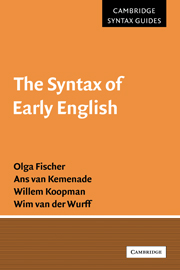Book contents
- Frontmatter
- Contents
- Preface
- List of editions used
- 1 Language change and grammar change
- 2 An outline of Old English syntax
- 3 An outline of Middle English syntax
- 4 The Verb-Second constraint and its loss
- 5 The loss of object–verb word order
- 6 Verb–particles in Old and Middle English
- 7 Changes in infinitival constructions
- 8 The history of the ‘easy-to-please’ construction
- 9 Grammaticalization and grammar change
- References
- Index
5 - The loss of object–verb word order
Published online by Cambridge University Press: 23 December 2009
- Frontmatter
- Contents
- Preface
- List of editions used
- 1 Language change and grammar change
- 2 An outline of Old English syntax
- 3 An outline of Middle English syntax
- 4 The Verb-Second constraint and its loss
- 5 The loss of object–verb word order
- 6 Verb–particles in Old and Middle English
- 7 Changes in infinitival constructions
- 8 The history of the ‘easy-to-please’ construction
- 9 Grammaticalization and grammar change
- References
- Index
Summary
Introduction
One of the most prominent syntactic differences between present-day English and earlier English involves the order of object and verb. Consider, for example, the sentences in (1)–(3), which are from the Old English, Early Middle English, and Late Middle English periods, respectively. We have italicized the relevant object(s).
(1) ond he his feorh generede, ond eah he wæs oft gewundad
and he his life saved and yet he was often wounded
‘and he saved his life, although he was often wounded’
(ChronA (Plummer) 755.38)(2) Hi hadden him manred maked and athes sworen,
they had him homage done and oaths sworn
ac hi nan treuthe ne holden
but they no truth not kept
‘They had done him homage and sworn oaths of allegiance to him, but they did not keep their word’
(ChronE (Plummer) 1137.11)(3) If so be that thou ne mayst nat thyn owene conseil hyde,
if so be that you not can not your own counsel hide
how darstou preyen any oother wight thy conseil secrely to kepe?
how dare-you ask any other person your counsel secret to keep
‘If it is the case that you cannot hide your own counsel, how could you dare to ask anyone else to keep your counsel secret?’
(Chaucer Melibee 1147)Each of these sentences has one or more objects preceding the lexical verb(s). In Modern English, of course, the object has to follow the verb, as the translations of (1)–(3) show.
Information
- Type
- Chapter
- Information
- The Syntax of Early English , pp. 138 - 179Publisher: Cambridge University PressPrint publication year: 2001
